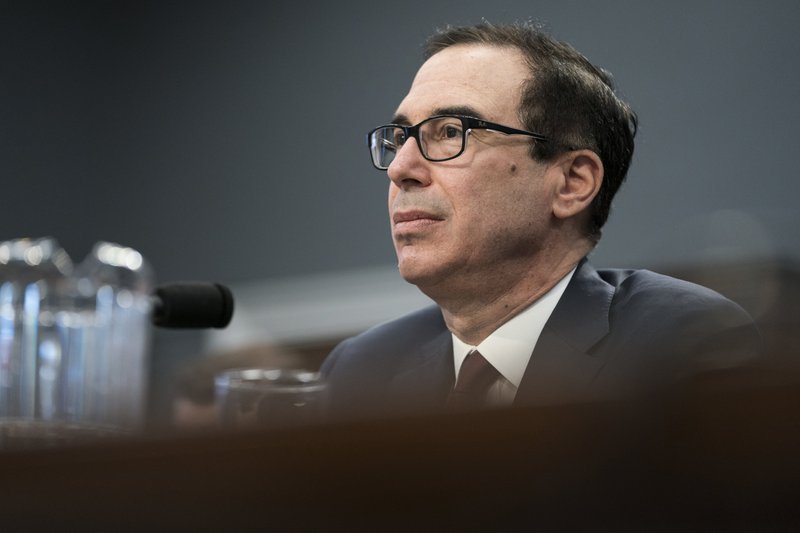WASHINGTON -- A confidential Internal Revenue Service legal memo says tax returns must be given to Congress unless the president takes the rare step of asserting executive privilege, according to a copy of the memo obtained by The Washington Post.
The memo contradicts the administration's justification for denying lawmakers' request for President Donald Trump's tax returns, exposing fissures in the executive branch.
Trump has refused to turn over his tax returns but has not invoked executive privilege. Treasury Secretary Steve Mnuchin has instead denied the returns by arguing there is no legislative purpose for demanding them.
But, according to the IRS memo, the disclosure of tax returns to the committee "is mandatory, requiring the Secretary to disclose returns, and return information, requested by the tax-writing Chairs."
The 10-page document says the law "does not allow the Secretary to exercise discretion in disclosing the information provided the statutory conditions are met" and directly rejects the reason that Mnuchin has cited for withholding the information.
"[T]he Secretary's obligation to disclose return and return information would not be affected by the failure of a tax writing committee ... to state a reason for the request," it says. It adds that the "only basis the agency's refusal to comply with a committee's subpoena would be the invocation of the doctrine of executive privilege."
The memo is the first sign of potential dissent within the administration over its approach to the tax-returns issue. The IRS said the memo, titled "Congressional Access to Returns and Return Information," was a draft document written by a lawyer in the Office of Chief Counsel and did not represent the agency's "official position." The memo is stamped "DRAFT," it is not signed, and it doesn't refer to Trump.
The agency says the memo was prepared last fall. At the time, Democrats were making clear that they would likely seek copies of Trump's tax returns under a 1924 law that states that the IRS "shall" turn over tax returns to Congress.
Precisely who wrote the memo and reviewed it could not be learned. The agency says IRS Commissioner Charles Rettig and current chief counsel Michael Desmond, who took over in February, were not familiar with it until a Washington Post inquiry this week. The IRS says it was never forwarded to the Treasury Department.
Executive privilege is generally defined as the president's ability to deny requests for information about internal administration talks and deliberations.
On Friday, Mnuchin rejected a subpoena from the House Ways and Means Committee to turn over the tax returns, a move that will likely lead to a court battle. Mnuchin has criticized the demands as harassment that could be directed against any political enemy, arguing that Congress lacks a "legitimate legislative purpose" in seeking the documents.
Breaking with precedent, Trump has refused to provide tax returns, saying they are under audit.
Mnuchin and other senior staff members never reviewed the IRS memo, according to a Treasury Department spokesman. But the spokesman said it did not undermine the department's argument that handing over the president's tax returns would run afoul of the Constitution's mandate that information given to Congress must pertain to legislative issues.
The spokesman said the secretary is following a legal analysis from the Justice Department that he "may not produce the requested private tax return information." Both agencies have denied requests for copies of the Justice Department's advice to the Treasury Department.
Trump has told advisers he will battle the issue to the Supreme Court, according to people familiar with the matter. Trump recently has argued that the tax returns were an issue in the 2016 election, but he won anyway -- so they should no longer be an issue.
The IRS memo describes how and why Congress has the authority to access tax returns, explaining the origin of the provision and how it has been interpreted over the decades.
It highlights the special powers given to three committees for compelling tax returns: the House Ways and Means Committee, the Senate Finance Committee and the Joint Committee on Taxation. Other congressional committees, the memo emphasizes, do not have the same authority to compel returns.
When it comes to the Ways and Means Committee, the obligation to divulge the returns "would not be affected by the failure" to give a reason for the request. By contrast, other committees "must include a purpose for their request for returns and return information when seeking access," the memo states.
"One potential basis" for refusing the returns, the memo states, would be if the administration invoked the doctrine of executive privilege.
But the IRS memo notes that executive privilege is most often invoked to protect information, such as opinions and recommendations, submitted as part of formulating policies and decisions. It even says the law "might be read to preclude a claim of executive privilege," meaning the law could be interpreted as saying executive privilege cannot be invoked to deny a subpoena.
Information for this article was contributed by Damian Paletta of The Washington Post.
A Section on 05/22/2019

